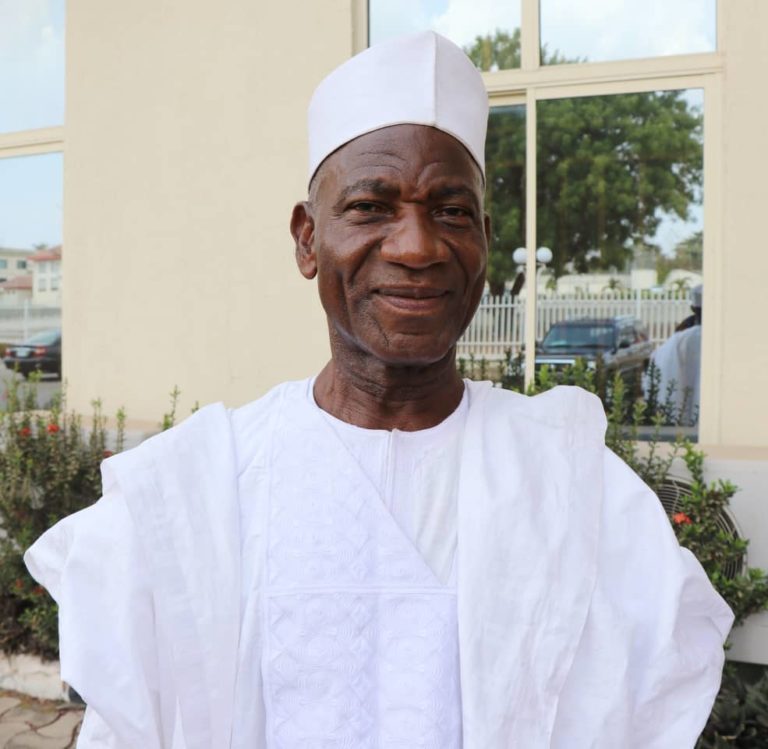News
O to Ge: Meet the 79-yr-old rival that retires Nigeria’s No 3 citizen
Published
7 years agoon
By
Editor
LAK Jimoh is a name many may have to beat out their brains to remember. And it’s not certain anybody not rooted in Kwara’s amala politics can have the foggiest recollection of the 79-year-old.
But the three-letter revolution he sparked up in Kwara, where Senate President Bukola Saraki just dropped off his loft as a politician and the third most powerful person in Nigeria, will ring bells for decades ahead.
“Every revolution starts like a seed, it grows to become an oak tree,’’ he told the News Agency of Nigeria in Ilorin.
Lazeez Ayinla Kolawole (LAK) has been robbed three times politically by the 40-year-long Saraki fiefdom in north-central state.
That explains his fervor in rousing the state citizen to stand up and revolt with their vote in the Feb 23 election where Saraki and his governing party PDP lost so much he wouldn’t even talk about it.
Saraki was defeated his stronghold, Kwara Central Senatorial zone, by the APC candidate, Ibrahim Oloriegbe.
Oloriegbe, a medical doctor, polled a total of 123,808 votes to defeat the Senate President who scored 68,994 votes in the four Local Governments Areas of Kwara Central Senatorial District.
Accprding to LAK, the “O to Ge’’ movement actually started in 2010 when he was an aspirant for the Kwara Central Senatorial seat under the PDP, preparatory to the 2011 general elections.
The 1971 graduate of Political Science from the University of Lagos said he contested the seat with Saraki, but was “robbed of his mandate’’.
Before, 2010, Jimoh said he had used a similar slogan, “It Is Time For Change’’ in 2003 when he contested Kwara governorship primaries of the PDP which was also won by Bukola Saraki.
“When I foresaw the revolution that will end the era of bad governance in Kwara, majority of the people did not see it,’ he said.
“People did not see it then and I was accused of being too revolutionary but I assured them that we will ultimately get there.
“Gradually, the revolution assumed the spine and magnitude that we just saw in this year’s election, when the people used the power of their votes to dethrone decades of a political dynasty that had impoverished Kwara,’’ he said.
Mr Jimoh, who left public service as a permanent secretary in 1982 for active politics, alleged that for 40 years, Kwara was under the “government of hegemony of exploitation, massive looting of public resources and administration so insensitive to the plights of the people’’.
He explained: “Kwara is not an industrial state, it is an agrarian state but today we do not have even a Ministry of Agriculture. We do not have any thriving agricultural project at all.
“All the Agric nurseries and training schools and even the land of the Ministry of Agriculture were sold out.’’
He said the media-hyped multi-billion Naira Shonga Farm project by Bukola Saraki as governor of Kwara was a sham.
“Billons of Naira were pumped into the project but till today no single farm product came out of the farm till it got moribund.
“It is all fraud. What they called Zimbabwe farmers were just farm workers who did not bring a dime to the state for investment yet they called them investors.
“It was the state government that borrowed billions of Naira from the defunct Intercontinental Bank and gave it to these people but we have nothing to show for it,’’ he said.
Mr Jimoh said that Kwara inherited some employment creating establishments like the Jebba Paper Mill, Tate and Lile Sugar manufacturing company in Bacita and the British Morris Tobacco Company, which had all collapsed because of hostile economic atmosphere.
He alleged that the state-owned Trade Bank was liquidated simply because the management was not cooperating with the state’s political authority to use the bank forthe looting of resources.
Mr Jimoh said under the watchful eyes of the past administrations also, state owned Gateway Insurance Company, Kwara Express and Kwara Hotels folded up.
He said the state had witnessed a total decay of infrastructure, ranging from bad roads, poor health delivery system, the collapse of environmental sanitation and educational system.
“When I saw all these, I said we must not continue in that way and allow these people to destroy the state.
“Then, I said, “O to Ge, Enough is Enough. We must rise against the misrule and slavery,’’ he said.
Mr Jimoh said the maladministration started having significant impact on the people when it was extended to the civil service when workers, pensioners and the common man started feeling the pinch.
He said the civil service, which ought to be the engine room of government, was politicised and turned to rubber stamp.
Mr Jimoh said some Level 12 officers with political godfathers were appointed Permanent Secretaries above their seniors, thereby dampening the morale of workers
He said the situation got so bad that government could no longer pay salaries of civil servants as well as gratuities and pensions of retirees.
“With reckless looting of the state’s treasury and siphoning of government money to individual pockets, the government could not pay salaries of civil servants.
“The entitlements of retirees after 35 years of active service to the state were not paid and they were regularly being called for screening during which many of them died.
“In 2008, the Bukola Saraki government borrowed N3.3 billion from Intercontinental Bank to settle the accumulated arrears of benefits of Kwara retirees.
“When the government received the money, a committee set up for the disbursement recommended that 50 per cent of the money be used for the pensioners while the balance be used for the development of infrastructure.’’
Mr Jimoh said the pensioners challenged the legality of the government’s decision to use the money borrowed to settle their entitlements for development of infrastructure.
He said the matter got to the Supreme Court and many of the pensioners were yet to be paid.
Mr Jimoh said the Local Government Administration was not left out in the maladministration with the establishment of the Joint Account System which he said left the Councils unproductive.
He said the cumulative effects of decades of bad governance led to the mass action and revolution fuelled the “O to Ge” movement that ended Saraki’s grip on Kwara politics.
“It is not just about campaign because the people of Kwara decided that they want a change of government because they were tired of the old order.
“What we have achieved today is the collective efforts of all Kwarans who wear the shoes and know where they pinch,’’ he said.
Trending

 Health7 days ago
Health7 days agoDeclassified CIA memo explored concealing mind-control drugs in vaccines

 Crime1 week ago
Crime1 week agoSenior police officers faces retirement after Disu’s appointment as acting IGP

 Comments and Issues1 week ago
Comments and Issues1 week ago20 Critical Fixes to Save Nigeria’s Democracy from Electoral Fraud

 Latest1 week ago
Latest1 week agoICPC yet to respond to El-Rufai’s bail request as arraignment date looms

 Comments and Issues1 week ago
Comments and Issues1 week agoGovernance Before Guns: Why Institutional Coherence Determines Security Outcomes

 Comments and Issues1 week ago
Comments and Issues1 week agoWho owns Abacha’s loot? Nigeria and the fight for the people’s money

 Comments and Issues1 week ago
Comments and Issues1 week agoShooting down inflation and rising poverty

 Latest6 days ago
Latest6 days agoFubara pledges collaboration with APC lawmakers after Rivers by-elections

